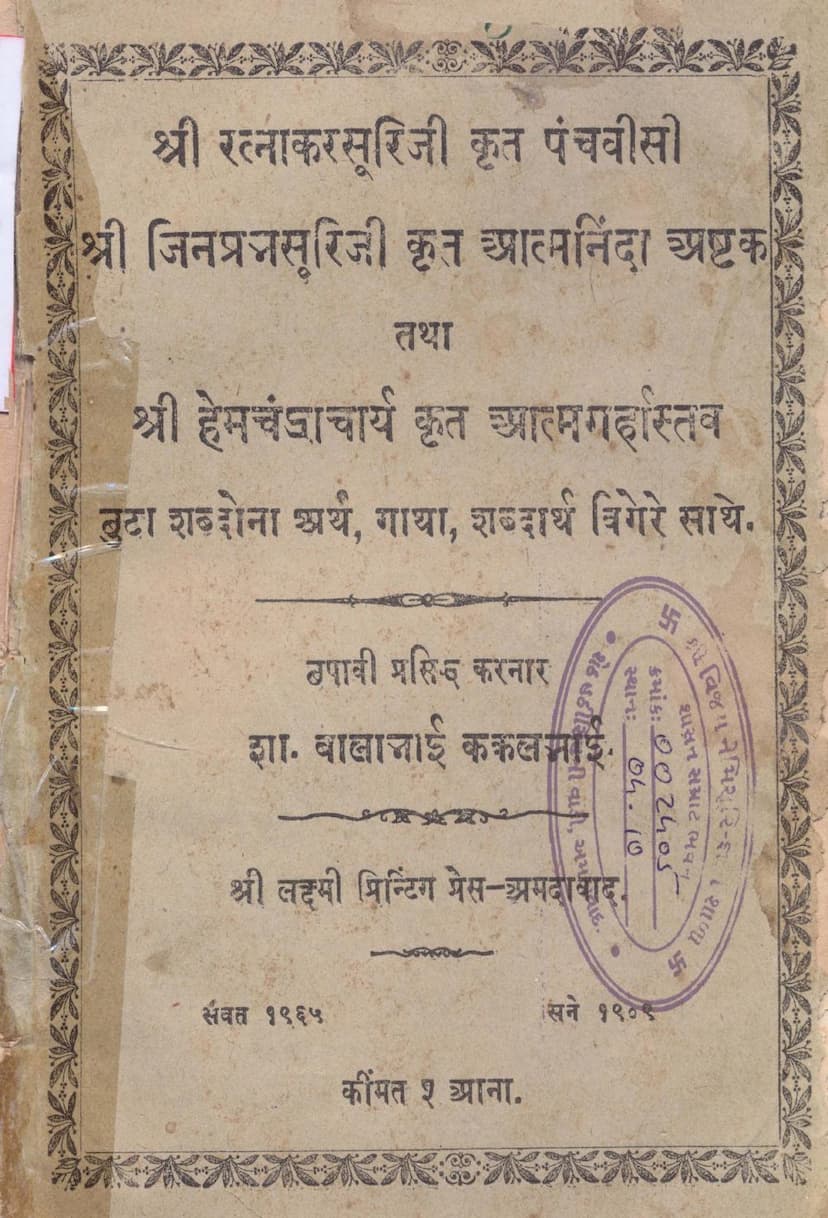Ratnakarsuri Krut Panchvisi Jinprabhsuri Krut Aatmnindashtak Hemchandracharya Krut Aatmgarhastava
Added to library: September 2, 2025

Summary
This Jain text is a collection of three devotional works by renowned Jain scholars, compiled and published in Samvat 1965 (1909 CE). The book includes:
-
Ratnakarsuri Krut Panchvisi (Twenty-five Verses by Ratnakarsuri):
- This section comprises 25 verses dedicated to praising the qualities of the Jina (victor or enlightened being).
- The verses highlight the Jina's omniscience (Sarvajna), presence of all perfections (Sarvatiśaya-pradhāna), mastery of knowledge and arts (Jnānakalā nidhi), and their role as the source of well-being (śreyaḥ śriyāṃ maṅgala kelisadma).
- The verses address the Jina as the dispeller of worldly sorrows and the savior from the cycle of birth and death (saṃsāra vikāra).
- The author expresses deep remorse and self-condemnation for past actions, acknowledging the futility of worldly pursuits and the absence of good deeds, such as charity, virtuous conduct, and penance.
- The verses reflect a deep sense of self-criticism and a longing for divine grace, recognizing personal shortcomings and the need for spiritual purification.
-
Jinaprabhsuri Krut Aatmninda Ashtak (Eight Verses on Self-Condemnation by Jinaprabhsuri):
- This section contains eight verses where the author deeply condemns himself for his past spiritual negligence and worldly attachments.
- The verses describe the author's remorse for not adhering to righteous conduct, engaging in worldly pleasures, and succumbing to vices like anger, greed, pride, and deceit.
- He laments the lost opportunities for spiritual growth, the accumulation of sins, and the suffering caused by his actions.
- The author expresses a profound sense of regret for neglecting the teachings of the Jina and failing to cultivate virtues like detachment and spiritual knowledge.
- The verses highlight the author's recognition of his own flaws and his plea for divine intervention to overcome them.
-
Hemchandracharya Krut Aatmagarastava (Praise of the Self by Hemchandracharya):
- This section features verses that praise the true, spiritual self.
- The verses suggest that the true self is inherently pure, blissful, and devoid of worldly attachments and desires.
- The author emphasizes the importance of realizing this inherent spiritual nature, which is distinct from the physical body and the fluctuations of the mind.
- The verses encourage the seeker to detach from worldly illusions and to connect with the divine essence within.
- The text advocates for introspection, spiritual discipline, and the pursuit of knowledge and virtue to attain liberation.
Overall Theme:
The collection as a whole serves as a powerful testament to the Jain emphasis on self-reflection, repentance, and the pursuit of spiritual liberation. The authors express profound sorrow for their past transgressions and worldly attachments, acknowledging their failures in following the path of righteousness. They highlight the transient nature of worldly pleasures and the devastating consequences of succumbing to negative emotions and actions.
The underlying message is one of seeking divine grace and guidance to overcome these shortcomings and to attain spiritual enlightenment. The collection serves as a guide for spiritual seekers to examine their own lives, identify their weaknesses, and strive for self-improvement through devotion, penance, and adherence to Jain principles. The underlying tone is one of humility, remorse, and an earnest desire for spiritual transformation.